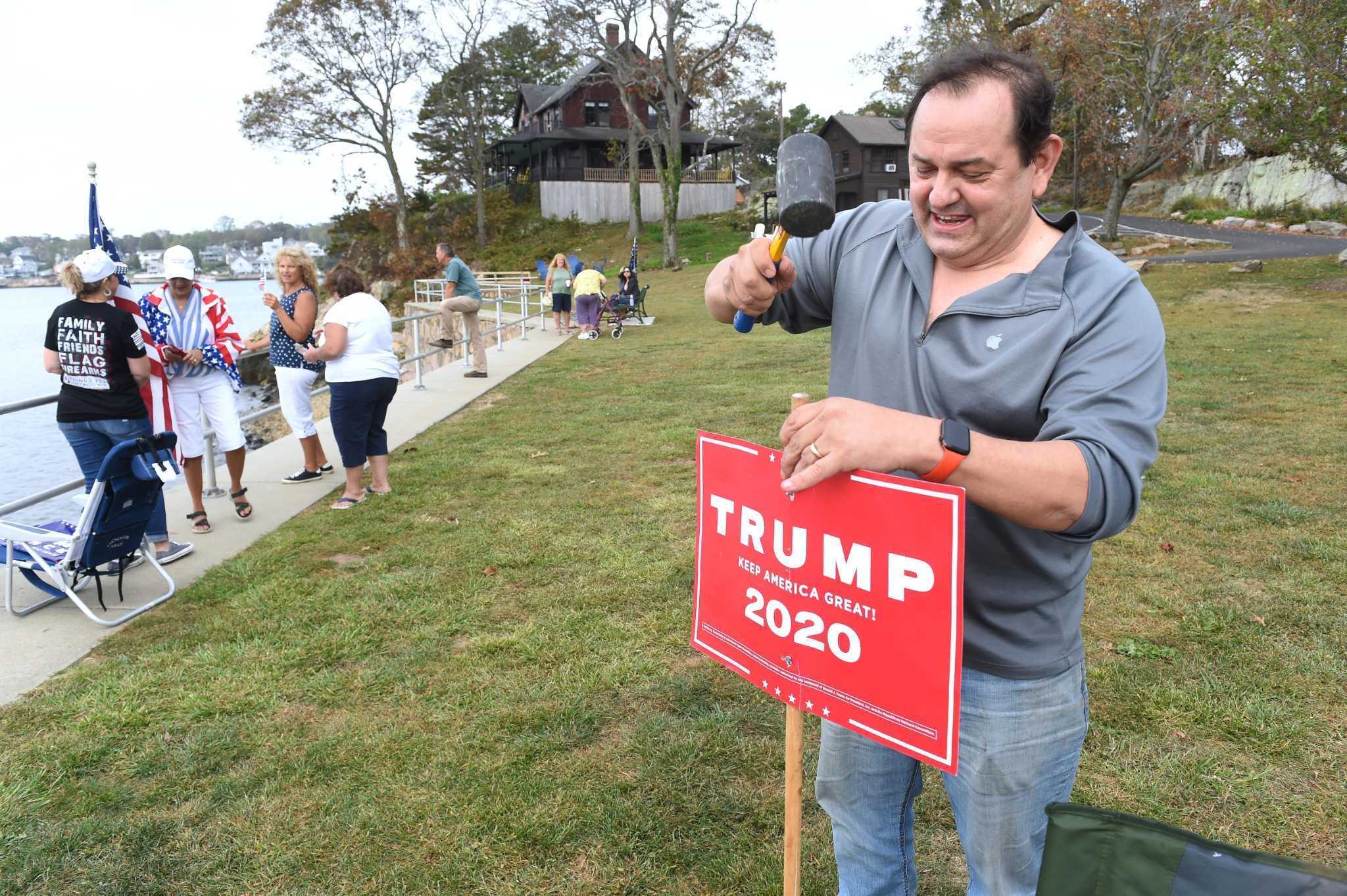‘A record of rejection.’ State batting away one group’s onslaught of election fraud claims

At a time when states across the country are restricting voting rights, Connecticut regulators have been swatting away one group’s relentless but unsubstantiated allegations of election fraud.
The effort is taking up time and money, authorities say.
Investigators and lawyers from the State Elections Enforcement Commission, in a rare admonishment, recently cited inadequate research and erroneous assumptions filed made by Linda Szynkowicz of Middletown, founder and president of the Wyoming-based Fight Voter Fraud, Inc., which was initially listed in now-outdated state documents as being located in her Middletown home.
Szynkowicz charged that during the 2020 presidential election, incarcerated people, unregistered adults and under-aged teens voted illegally in Connecticut.
“The Commission notes that, while significant commission resources were required to process and definitively disprove the allegations contained in these complaints, complainant could have avoided the waste of these resources if she had ascertained the requirements of the law and the meaning of the data she produced as evidence,” the SEEC recently ruled. “The commission would strongly encourage those who hold themselves out as authorities on election law investigations to educate themselves on both the facts and law of the complaints they file with the Commission to avoid the needless waste of the limited investigatory resources of the Commission.”
Thirty two of the complaints involved claims that incarcerated people should have been prohibited from voting were allowed to cast ballots. Another 18 complaints alleged that under-aged teens were allowed to vote, and others charged that unregistered people voted in the contentious Nov. 2020 election, won by Joe Biden. The allegations were all dismissed, while several more are pending before the SEEC.
Another rejected complaint cited the photo of an alleged over-stuffed outdoor ballot box, which GOP members of the General Assembly’s key elections committee cited in floor debates earlier this year as proof of fraud. The SEEC found that the ballots were collected several times a day in West Haven before the August, 2020 primary, the box was locked after the primary and the ballots placed there, photographed and ruled ineligible by local voting officials.
The photo, according to the SEEC, was provided by Dominic Rapini, a Branford Republican who is campaigning for secretary of the state. Rapini recently resigned as chairman of the board of Fight Voter Fraud.
Rapini said this week that he still supports the work of Fight Voter Fraud, but he quit the group at the beginning of August, around the time that the SEEC dismissed dozens of Szynkowicz’s complaints. Rapini defended the use of the image, stressing that it raises questions about the ballots’ chain of custody..
In February, Rapini, as chairman of the board of Fight Voter Fraud, made several allegations of election irregularities to the General Assembly, and attacked proposals to amend the state Constitution to make it easier to vote by mail-in balloting.
According to the SEEC, in 2021, there have been 56 complaints from Szynkowicz that were filed, investigated and dismissed, five of which named Fight Voter Fraud Inc. as co-complainant. Five more complaints from Szynkowicz, one with Rapini as co-complainant, are pending before the SEEC.
“We gave the SEEC a chance to do their job,” Rapini said in a phone interview, taking time out from the early stages of his statewide effort to win the GOP nomination for secretary of the state, Connecticut top election official, in 2022. “I think we should raise awareness. Felons not yet sentenced can’t walk around downtown, can’t have conjugal visits, but they can vote.” When asked why he left the leadership of Fight Voter Fraud, Rapini said “I felt I had to do something different.”
“The SEEC picks and chooses what statutes they enforce,” Szynkowicz said in an interview. “We want one vote for one legal voter. The voter rolls in Connecticut need to be purged. There are 11,000 dead people on voter rolls. If we want fair elections, we need to make sure there is no fraud. That is not happening. The secretary of the state is not purging people who moved or died.”
Department of Consumer Protection investigating
Under state law, it’s up to local registrars to remove voters from the rolls of electors in the 169 towns and cities.
“After wasting thousands of taxpayer dollars and hundreds of man-hours chasing down frivolous complaints, it would be appropriate for election deniers to show an ounce of humility,” said Gabe Rosenberg, general counsel for Secretary of the State Denise Merrill.
“Instead, we get more irresponsible half-truths, misstatements, and outright lies designed to erode voter’s trust in Connecticut elections,” Rosenberg said Tuesday. “The truth is that Connecticut has among the most accurate voter rolls in the country, and the credit for that should go to the bipartisan group of hard-working local election officials in every town in Connecticut, who instead of grandstanding put in the work every day to ensure that Connecticut voters can trust their world-class elections.”
Michael J. Brandi, executive director and chief counsel for the State Elections Enforcement Commission, said that Szynkowicz’s complaints have set a record of rejection and taken a lot of SEEC staff time.
“It’s unprecedented,” Brandi said. “We have people in the state that file a lot of complaints, but more often than not, those people do their research. To put it in perspective, fifty complaints is normally about a third of our annual caseload. It has taken up an inordinate amount of our resources, including the time of three investigators and two attorneys, not to mention the time of our Commissioners, and the folks at the Department of Correction and the registrars of voters who helped debunk all these claims. But we’re obligated to respond.”
Fight Voter Fraud claims to be a 501(c)4 non-profit, which does not have to report the identities of its contributors or its financial records. It takes credit card donations, sells T-shirts for $24.95 plus shipping and includes Szynkowicz’s phone number and Middletown home address as contact information.
Szynkowicz declined to discuss the membership of the board, its current board chairman, its financial details, or the size of Fight Vote Fraud’s membership. She said she is currently not getting paid by the organization.
“I am doing this for every citizen in Connecticut to make sure we have clean elections,” she said, adding that it was recommended to her to register the group as a non-profit in Wyoming because among other things, it’s less-expensive at $25 a year.
She said that “more than several hundred people” have spent months preparing a report Fight Voter Fraud expects to release within the next few weeks, including data on deceased people whose identities have been used to cast ballots. “I call them my silent army of volunteers,” Szynkowicz said of her supporters, in a Monday phone interview.
But now, the state Department of Consumer Protection is investigating whether Fight Voter Fraud Inc., which was first registered with the Connecticut Secretary of the State’s business unit in March of 2019, then dissolved in July of the same year, is a valid 501(c)4 fund-raising charity as the organization claims.
In May, 2019, it registered with the Wyoming secretary of state. Szynkowicz, Rapini and other members of the board including Treasurer and Secretary Linda Salafia and three other board member including Faith Ham, Robert Ham and George Skakel are all listed at the same Casper, Wyoming address as its agent, Legalinc Corporate Services Inc.
In order to raise money in Connecticut, a charity must be registered with the state, according to the DCP. Szynkowicz, who lost a state House of Representatives race as a Republican in 2020, said Monday that she is in the process of registering in Connecticut.
State Republicans slowed constitutional amendment process
The Fight Voter Fraud board of directors had been led by Rapini, who lost the GOP primary for U.S. Senate in 2018 and has set his future sights on a run for secretary of the state, which administers the state’s elections, along with local town clerks and voter registrars. During the recent legislative session, Rapini, speaking as board chairman, testified against legislation aimed at making it easier for people to cast ballots through the mail.
Recently rejected claims of Fight Voter Fraud were cited by conservative Republicans in the General Assembly this year in attempt to allege statewide election irregularities. But the Democratic majorities in the House and Senate approved two amendments to the state Constitution, one of which will let statewide voters in 2022 decide whether to allow early voting. Another amendment, to create universal mail-in balloting, met opposition by Republicans and failed to meet the 75-percent threshold, and needs to be approved by the next general assembly, elected in 2022, to possibly get on the 2024 ballot.
The Brennan Center for Justice recently reported that by mid-July 18 states enacted 30 laws aimed at making it harder to vote, including new restrictions on mail-in balloting, creating tougher identification requirements and allowing “faulty” voter purges to occur.
Tom Swan, executive director of the Connecticut Citizen Action Group consumer advocacy group, said nationwide, conservative groups use the secrecy provided by 501(c)4 status to shield their members, finances and expenditures from public disclosure.
“They are pretty clear in their intention to suppress the vote, particularly in communities of color,” Swan said. “The 501(c)4 filings are being used more and more to shield corporate interests.”
Cheri Quickmire, executive director of Common Cause in Connecticut, the election watchdogs and voter advocates, agreed that false claims are a nationwide phenomenon. “There are so many groups who are not interested in having as many people as possible vote,” she said.
“Voter fraud is not the problem,” Quickmire said. “The problem is getting enough people access to the ballot and encouraging voters. I just think things are more difficult now because we don’t have the full protection of the (federal) Voter Rights Act. Ground like Fight Voter Fraud spend so much time stoking the myth of voter fraud that it suppresses the vote, rather than encouraging it.”
Nationwide, conservative groups continue to pursue the “Stop the Steal” tactics that led to the violent invasion of the U.S. Capitol on Jan. 6, as Congress was about to ratify the Electoral College vote that led to Joe Biden’s presidential inauguration.
Both Rapini and Szynkowicz on Monday declined to say whether they thought Donald Trump was reelected last November.
“That’s not anything for me to determine,” Szynkowicz said. “We’re a non-partisan nonprofit.”
“I believe that Connecticut voters care about voting in places like Bridgeport,” Rapini said. “I am laser focused on Connecticut. Everything else is just noise.”
kdixon@ctpost.com Twitter: @KenDixonCT
*** This article has been archived for your research. The original version from CTPost can be found here ***


